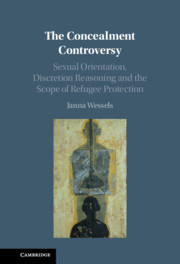‘Janna Wessels’ detailed and enthralling book guides the reader on a journey into the complex underbelly of refugee law, and asks some of the most fundamental questions about the scope of state responsibilities to protect persons at risk of harm on account of their inherent characteristics (race, ethnicity, sex or gender, sexual orientation), or their opinions and beliefs. While her analysis is focused on the often incompatible jurisprudence and literature on sexual orientation claims, the book is relevant for all types of refugee claims. It is a compelling read.’
Alice Edwards - former Chief of Protection Policy and Legal Advice, UNHCR
‘Among the many books on the interpretation of the refugee definition, this one clearly stands out. It masterfully demonstrates how ‘discretion’ reasoning is deeply entrenched in both common and civil law jurisdictions, and provides a path for reconsidering the scope of refugee protection. Superbly written, highly original, it is a must-read for academics and practitioners working in this area of law.’
Hélène Lambert - University of Technology Sydney
‘This timely and provocative book prompts a reconsideration of what, and whom, refugee law protects – and why. Wessels’ detailed study argues that ‘discretion’ reasoning permeates refugee decision-making across the board, resulting in systemic instability. Her work provides insights into the relationship between human rights law and refugee law, and the protection regime as a whole.
Jane McAdam - Scientia Professor and Director of the Andrew and Renata Kaldor Centre for International Refugee Law, University of New South Wales Sydney
‘This book is the result of a fascinating project at the cutting edge of refugee legal studies. Wessels examines how (primarily Global North) states make decisions on who is entitled to international protection from a new perspective – the presumption of a duty on a refugee to behave discreetly in their home country – which has entered decision making in many countries. This book is mandatory reading for all refugee law scholars.’
Elspeth Guild - Jean Monnet Professor ad personam at Queen Mary University of London, Emeritus Professor at Radboud University Nijmegen, and partner at Kingsley Napley LLP
‘The Concealment Controversy is an original and timely intervention in a longstanding debate within refugee law, namely, the role of ‘discretion reasoning’. Wessels examines why the notion has proven so remarkably resistant despite consistent critique. Drawing on queer theory, and a (rare) close examination of civil law jurisprudence, Wessels expertly identifies the tensions in current approaches. Her critical and thought-provoking work promises to offer new ways of approaching refugee protection and is a must-read for students, scholars, and refugee decision makers alike.’
Michelle Foster - Director, Peter McMullin Centre on Statelessness, Melbourne Law School
‘Wessels’ response to an important gap in refugee law scholarship will be paradigmatic for future debates on the substance and method of refugee status determination. I find her work to be thoughtfully argued, profound and accessible. She invites us to rethink the tenets of refugee law in a way that is both intellectually honest and sensitive to the price they exact.’
Gregor Noll - Torsten Söderberg Research Professor at the School of Business, Economics and Law and Professor of International Law, Gothenburg University
‘Considering its original data and innovative approach, Wessels’ book will be of interest to scholars of international migration, specifically in the fields of refugee and queer migration studies.’
Asuncion Fresnoza-Flot
Source: International Migration Review
‘… rich in material, precise and excitingly written … It is to be hoped that this paradigmatic work will be widely received beyond refugee law - particularly in feminist legal scholarship.’
Nils Weinberg
Source: Kritische Justiz
‘… a must-read for all scholars and practitioners in the field of refugee law.’
Davide Tomaselli
Source: International Journal of Refugee Law



